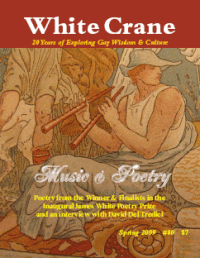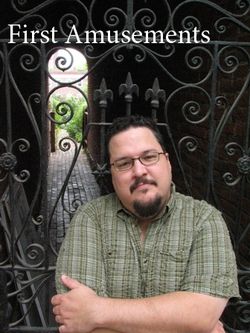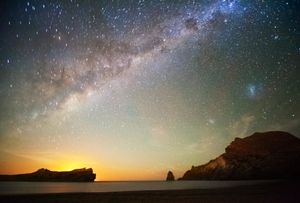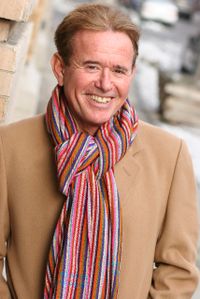A fascinating lecture from the former Secretary of Labor…before The Fall From Grace. This is, admittedly, long. But well worth the time.
All posts by Editors
Disturbing Video of the Mormon Kiss Couple Arrest
Apparently a security camera caught security guards confronting a gay couple after they kissed on the LDS plaza in Salt Lake City, Utah, on July 9, 2009. YouTube processed this file at double speed and shows a group of Mormon goons in suits arguing with Matt Aune and Derek Jones before handcuffing them. Charges against Aune and Jones have since been dropped.
WC80 Music & Poetry Issue
Music & Poetry
Hi Friends!
Below are excerpts from
our latest issue!
Please understand that we rely on the
support of subscribers to keep going.
So, subscribe today and keep the conversation going! Consider giving a gift subscription to your friends who could use some wisdom!
Columns
Opening Words "First Amusements" The Editors
Updrafts by Dan Vera
"Animal, Vegetable, Mineral" Praxis by Andrew Ramer
Call for Submissions
Subscriber Information
Contribution Information
Taking Issue
A WHITE CRANE CONVERSATION
"Gay Orpheus" - David Del Tredici
By Ray WarmanThe Creative Universe by Arthur Evans
"Come, Creator Spirit" A 9th Century Hymn Translated for the 21st
By Rabanus Maurus, Translation by Arthur Evans"The Peace of Gentle Waves" A Poem for Jaheem Herrera by Cleo Creech
"Big Joy" A Documentary Film Project about James Broughton
Bo Young Speaks with Stephen Silha
2009 White Crane / James White Poetry Prize
Winner – James Nawrocki
“House Fire”
“Golden Gate,”
“Fortune Cookie”
“From Cole Street”Finalist – Jeremy Halinen
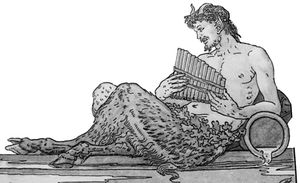
“Afternoons Above I-5”
“I-90 Westbound from Spokane,”
“Buggering You under an Apple Tree”
“Note”Finalist – James Najarian
“Travelogue”
“My Big Head”
Culture Reviews
Didjeradoo by Dreamtime
Reviewed by Bo Young
Signals By Ed Madden
Reviewed by Dan Vera
Our Caribbean: A Gathering of Lesbian and Gay Writing From The Antilles
Edited by Thomas Glave
Reviewed by Dan Vera
Subscribe today and keep the conversation going! Consider giving a gift subscription to your friends who could use some wisdom! If there's an article listed above that was not excerpted online, copies of this issue are available for purchase. Contact us at editors@gaywisdom.org
WC80 – Editor’s Note
It’s hard not to take a defensive crouch when writing an introductory essay to a special issue on poetry and music. Truth be told, the defensiveness has more to do with the poetry than the music. Music everyone loves and understands. Poetry? That is a more contentious idea. Or seems to be.
I feel compelled to make the case for poetry, to argue for the importance of poetry and the desire for others to read more poetry. Arguments of this kind usually include a mention of the endangered nature of poetry, how no one reads it anymore and how it’s tied to the decay in society. I somewhat agree with all these things, but those kinds of essays always take on the feel of a commercial for high-fiber cereal “You should eat it because its good for you damnit!”
The truth is I’ve always found these kinds of arguments a bit boring and beside the point. Poetry is in our lives and has been there since the beginning. Think of it. For most of us our first real exposure to poetry occurs in childhood with rhymes and little stories.
Jack be nimble, jack be quick…
Jack Sprat could eat no fat… (Jack was a busy boy.)
Eeny, meeny, miny, moe…
They’re the indelible songs we first learned
Mary had a little lamb…
Twinkle twinkle little star…
These poems are the first stories that stuck because they embedded themselves in the brain. But somewhere down the line — and it almost always happened (or happens) in a classroom — the pleasurable experience of enjoying this art form of wordplay is replaced with a mechanical exercise in pulling the little wonder apart, in dissecting the corpse of what was so alive in the ear. For most people I’ve spoken with, these approaches had the result of causing them to run for the exits.
For the last 7 years I’ve run a small reading series in my neighborhood. Most of our work in building an audience has been rehabilitating poetry in the ears and minds of the people who come forth; healing the bad memory of poetry as an aloof inaccessible thing or a laborious exercise for the listener. Our readings are a bit different as we choose a theme and then collect poems from the contemporary and legacy poets we know. So if you came to our reading on “dog poetry” (every June) you would hear 45 of the best poems on dogs written in the English language (some translated into English). So it’s more like an anthology. I mention this not as a plug for a local series but to share that we rarely have the opportunity to hear, much less read good poetry. With the exception of The New Yorker, it is rare to find a poem in a magazine today. Much rarer Gay poetry. I can’t tell you the last time that The Advocate published a poem in its pages.
This was not always this way. Not long ago it was unheard of to publish a magazine without having a poetry editor and publishing a few poems in magazines. [White Crane has long had a poetry editor. Bo Young, the publisher in these parts, began his connection to the magazine as it’s poetry editor. I served as poetry editor for RFD before coming to White Crane.] Theories abound as to the why and when this changed but that’s not really the point here. The point is that there is great poetry being written today but fewer places to read it and fewer places to enjoy the best.
We care about poetry here. For no other reason than poetry is Gay. Yes, I wrote it. Poetry is so Gay. It’s impossible to know the history of the art form and deny that it bears a huge resonance for Gay people and that Gay people have mastered it in powerful ways. Do I need to make the list? Okay then: Whitman, Dickinson, Lowell, Cavafy, Stein, Bynner, Lorca, Lorde, Bishop, Auden, Jordan, Ginsberg, Hughes. All Gay. The list is too long to write here and I haven’t even touched the contemporary poets.
So no defensiveness then. We publish poetry because Gay people write poetry. Damn good poetry too. Which brings us to the damn good poetry in this issue (see how these things flow?).
We’re delighted in this issue to publish the poetry of James Nawrocki, the first winner of the White Crane/James White Poetry Prize for Gay Men’s Poetry. Nawrocki hails from San Francisco, and we here at White Crane are proud of the fact that his work has previously appeared in these pages. The prize itself was judged this year by the powerfully good poet Mark Doty, who has honored us all by looking through the work of the finalists and selecting Nawrocki’s manuscript for publication. We are also proud to publish some poems by the two other finalists Jeremy Halinen of Seattle and James Najarian of Boston.
In striving to honor the muses of Poetry and Music, we have a fantastic interview with the Pulitzer-prize winning composer David Del Tredici and an essay by Arthur Evans on the creative universe.
So enjoy! And I hope you are amused.
Amused. That’s the word the poet Frank O’Hara used when he came across something that really moved him. Something that “touched his muse.” If he loved something, he found it “amusing.” If he was not impressed or moved, he found it “unamusing.” It’s perhaps one of my favorite phrases and I share it with you.
Be amused. Be very amused.
Dan Vera is the White Crane's managing editor. He is also the author of the recently released book of poetry, The Space Between Our Danger and Delight (Beothuk Books). He lives in Washington DC. For more on Dan visit www.danvera.com
For more White Crane, become a fan on Facebook and join us on Yahoogroups.
Subscribe today and keep the conversation going! Consider giving a gift subscription to
your friends who could use some wisdom! If there's an article listed
above that was not excerpted online, copies of this issue are available
for purchase. Contact us at editors@gaywisdom.org
WC80 – James White Poetry Prize – Finalist
James Najarian
Finalist for the 2009 White Crane / James White Poetry Prize
Travelogue by James Najarian
Our travel papers are seldom in order.
We lack a visa, or the proper stamps.
More often than not, we're stopped at the border,Our documents held to the light, just like this.
Our endorsements are in the wrong color ink,
Our signatures void, our persons suspicious.This isn't the first time we've been refused entry.
You are a country we will never visit.
We view your coast from a deck on the sea,Or get a hold of photographs, somewhere.
The kind of pictures that reveal nothing –
Cloudy landscapes taken from the air –They tell us nothing we're not meant to know.
No one responds to calls at the consulate.
There's no national airline or tourist bureau.You are a nation whose borders are closed:
A tiny state in the hills, like Bhutan.
The ridges and valleys stay unexposed.Or you are a gap on the map of the world;
Your body, a continent, could be Antartica:
Cool, pale, and barely explored;It could be perilous – the Khyber Pass,
A place without settlers – the Serengeti,
Or a place found only on a prewar atlasWhere half the globe is either pink or blue
Ubangi-Shari, or Bechuanaland,
Or someplace even harder to get to:Cathay, Cibola, Lemuria, Mu.
James Najarian teaches nineteenth-century poetry at Boston College. He is the author of the critical work Victorian Keats: Masculinity, Sexuality, and Desire published in 2002 by Palgrave Macmillan. He lives in the Brighton section of Boston.
For more White Crane, become a fan on Facebook and join us on Yahoogroups.
Subscribe today and keep the conversation going! Consider giving a gift subscription to
your friends who could use some wisdom! If there's an article listed
above that was not excerpted online, copies of this issue are available
for purchase. Contact us at editors@gaywisdom.org
WC80 – James White Poetry Prize – Winner
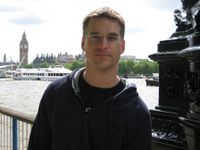 James Nawrocki
James Nawrocki
Winner of the 2009 White Crane / James White Poetry Prize
His winning manuscript House Fire will be published by White Crane Books.
House Fire by James Nawrocki
It seems too staged, too weirdly poetic this way,
the house where we first met going up in flames
but this is exactly what I come out from my yard to find
as the sirens die at their loudest just up the street
and I follow the uphill stream of spectators
and the trail of the smoke blowing down to usto find the fire has picked this one. The truth is
we never really came to much: a few torrid meetings
when you were renting a room there and I
trudged up the slope to your door. The truth is
we fell into each other too fast and lasted
just as long as our particular heat required, as if
desire had been stored up in us like so much fuel
and its reckoning had come. We’ve moved onand now this haunt meets its end as well, the orange flames
like the arms of a maniacal crowd tearing at the wood,
flinging their colors out the ruined windows as if
to answer the gaze of all these witnesses:
the curious, the bystanders, none innocent, none without
a bit of that gleaming-eyed thrill
that regards all destruction.
Golden Gate by James Nawrocki
Brian and I step off
the road into sloping dirt,
down steps molded from
arms and feet of roots,
the trees’ bodies bent down
and standing up, like prayer,
the light there and gone
and there again
as we run
beyond the halted trees
and land safely
at each leap down
from shade into the pitch
of sun and rock,
our feet passing,
pressed in the dust
with other feet as we come
toward the Pacific.
Maybe this is the only way
we will ever free ourselves,
not up from the world, but down
to front the double vault
of heaven and ocean,
the beach like the brief margin
between two states,
the vastness
that teaches the body to be small.
A native of Ohio, James Nawrocki has lived in San Francisco for over 13 years where he works in corporate communications. In addition to having appeared in White Crane, Nawrocki’s poems have appeared in Kyoto Journal, Chroma Journal, Gay & Lesbian Review Worldwide, Poetry, Poetry Daily, modern words, The James White Review, Mudfish and numerous other publications. His fiction and essays have appeared in Gay & Lesbian Review Worldwide and Geek Monthly.
For more White Crane, become a fan on Facebook and join us on Yahoogroups.
Subscribe today and keep the conversation going! Consider giving a gift subscription to
your friends who could use some wisdom! If there's an article listed
above that was not excerpted online, copies of this issue are available
for purchase. Contact us at editors@gaywisdom.org
WC80 – James White Poetry Prize – Finalist
Jeremy Halinen
Finalist for the 2009 White Crane / James White Poetry Prize
Afternoons Above I-5 by Jeremy Halinen
We used to drop acid
and sit on the overpass
to watch the dragon faces
the cars would make at us
as they raced
beneath our dangling legs.
Cars like it when you’re high enough
above them to notice
more than their surfaces.
It’s the story of their exhaust
they want you to care about,
not their paint jobs
or the treads
on their tires. They want you to lean down
and touch them.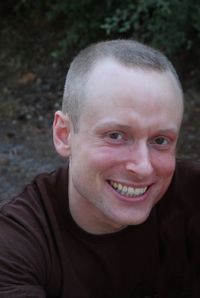 I know what you’re thinking.
I know what you’re thinking.
It’s dangerous,
what we used to do. But
the cars told us they’d catch us if we fell.
You say, So what if they did?
And you’re right.
There’s always a catch.
Jeremy Halinen is a coeditor and cofounder of Knockout Literary Magazine. Some of his recent poems appear in Arroyo Literary Review; Best Gay Poetry 2008; Dos Passos Review; OCHO, Pontoon: An Anthology of Washington State Poets; and Rio Grande Review. He holds a MFA in creative writing from Eastern Washington University, where he served as poetry editor of Willow Springs. He resides in Seattle.
WC90 – Arthur Evans – Come, Creator Spirit
Come, Creator Spirit
By Rabanus Maurus,
Translation from the Latin by Arthur Evans
Come, Creator Spirit,
Visit the minds of your people.
Fill with grace from above
The hearts that you have made.
You, who are called the Inspirer,
Gift of God in highest Heaven,
Living Fountain, Fire, Love,
And Spiritual Anointing,
You, benefiting us in seven ways,
Finger of the Father’s hand,
You, the Father’s faithful promise,
Enriching tongues with speech,
Light a lamp amid our senses,
And into our hearts, pour love.
Fortify with lasting virtue
The weakness of our bodies.
Push back the foe, far away.
Let peace be near at hand.
Be thus our leader, out in front,
To save us everywhere from harm.
May we, through you, discern the Father
And learn as well the Son,
And also trust in you,
Their Spirit, throughout all time.
Glory be to God the Father,
And to the Son, arisen from the dead,
And to the Inspirer,
For age on age to come.
Amen.
= = =
Veni, Creator Spiritus,
mentes tuorum visita.
Imple superna gratia
quae creatis pectora.
Qui diceris Paraclitus,
altissimi donum Dei,
fons vivus, ignis, caritas,
et spiritalis unctio,
Tu, septiformis munere,
digitus paternae dexterae,
Tu rite promissum Patris,
sermone ditans guttura,
Accende lumen sensibus,
infunde amorem cordibus,
infirma nostri corporis
virtute firmans perpeti.
Hostem repellas longius,
pacemque dones protinus.
Ductore sic te praevio
vitemus omne noxium.
Per te sciamus da Patrem,
noscamus atque Filium.
Teque utriusque Spiritum
credamus omni tempore.
Deo Patri sit gloria,
et Filio, qui a mortuis
surrexit, ac Paraclito,
in saeculorum saecula.
Amen.
This is just an excerpt from this issue. We are a reader-supported journal and need you to subscribe to keep this conversation going. So to read more from this wonderful issue SUBSCRIBE to White Crane. Thanks!
Arthur Evans is the author of Witchcraft and the Gay Counterculture (1978) The God of Ecstasy: Sex Roles and the Madness of Dionysus (1988) and Critique of Patriarchal Reason (1997). He lives in San Francisco.
WC80 – Arthur Evans on The Creative Universe
The Creative Universe by Arthur Evans
IN THE 9TH CENTURY, a learned Benedictine abbot of Fulda, in what is today called Germany, wrote a memorable hymn in Latin. It has inspired many subsequent thinkers and artists, including Mozart and Mahler.
The abbot’s name is Rabanus Maurus, and his hymn is Come, Creator Spirit (Veni, Creator Spiritus). The work is memorable because of its simple poetic beauty. In addition, it straddles the cultural divide between earlier pagan motifs and the newer notions of Christianity.
Because of this mythological latitude, the hymn has a richness of content that transcends the narrowness of Christian theology. In fact, it may appeal to people today who have developed “cosmic consciousness” (that is, who regard the universe as alive and creative). What follows is an exploration of this richness, along with a new translation of the text.
Spirit (Energy)
The hymn’s principle theme is the Creator Spirit (Creator Spiritus), a subject that brings to mind the older pagan concept of the Universal Soul (Anima Mundi). The ancients conceived of the Universal Soul as a creative energy suffusing the cosmos and all forms of life, commonly symbolized by fire.
The ancients saw the Universal Soul as an extrapolation of the various particular energies they experienced in natural phenomena. Every lake, mountain, or vale, as well as every human being, had a characteristic energy that the ancients called its genius (genii in the plural). This term is the source of our own word with the same spelling, but with different meaning.
Each thing’s genius stimulated human beings emotionally and intellectually. The result was a lively personal relationship and dialog with the genii of trees, mountains, and stars. The whole universe had its own genius, too, which was the Universal Soul.
Christian mythology took the Universal Soul and blended it with “the Inspirer,” a divine-like figure sketchily mentioned in the New Testament. The Greek word for this figure is Parakletos. It became Paraclitus in Latin, which is how it appears in Maurus’ hymn. It is often translated as “the Comforter,” which misses its force.
Before the New Testament, a parakletos was an advocate or lawyer who spoke on behalf of defendants in court. In the New Testament, the word means the inspiring force that enables the faithful to stand up and be their own advocates in the trials of life and faith. Such a positive function goes beyond comforting to inspiring.
Subsequent to the New Testament, some early church writers described the Inspirer as the dispenser of seven benefits to humanity. These are commonly understood as various virtues mentioned in the Bible, but the connection is murky.
After mixing the Universal Soul with the Inspirer, Christian mythology added the Old Testament’s Shekhinah, God’s presence in the world. The resulting composite figure was the Holy Spirit, the third person of the Holy Trinity.
Maurus’ hymn has echoes of all these motifs. But the hymn’s principal chord is the notion, derived from paganism, of the universal creative energy that inspires and elevates humanity. A pagan from pre-Christian antiquity would have readily interpreted in this way all his references to the “Creator Spirit.”
Father (Universe)
Pagan antiquity generally presupposed that everything was to some degree alive. The universe as a whole was no exception. Accordingly, the ancients typically regarded the universe as a huge living organism, the almighty and divine parent of every particular thing that comes into being. The Universal Soul that suffused all things was grounded in this universal parent, from which it eternally proceeded.
Christian mythology fused the fathering universe with the Old Testament’s Lord of Hosts (Yahweh Sabaoth) and Almighty God (El Shadai). The resulting composite figure was God the Father Almighty, the first person of the Holy Trinity. He was conceived as generating from himself all that was or is or will be.
Maurus’ hymn mentions “the Father,” “God,” and “God the Father.” But a pagan reader from classical antiquity, who knew nothing of Christianity, would regard these phrases as referring to the creative universe. Educated pagans, in particular, would be reminded of a familiar Stoic theme. This was the notion of Zeus as the creative, rational order of the universe, made famous by a stirring poem of Cleanthes, written 300 years before the New Testament.
This is just an excerpt from this issue. We are a reader-supported journal and need you to subscribe to keep this conversation going. So to read more from this wonderful issue SUBSCRIBE to White Crane. Thanks!
Arthur Evans is the author of Witchcraft and the Gay Counterculture (1978) The God of Ecstasy: Sex Roles and the Madness of Dionysus (1988) and Critique of Patriarchal Reason (1997). He lives in San Francisco.
WC80 – David Del Tredici Interviewed
Gay Orpheus
Ray Warman Speaks with David Del Tredici
Generally recognized as the father of the Neo-Romantic movement in music, David Del Tredici – over a compositional career spanning five decades and (stronger than ever!) still counting – has received, among other awards, the Pulitzer Prize for Music, a Grammy nomination and an OUTMusic award. His music has been commissioned and performed by nearly every major American and European orchestral ensemble.
“Del Tredici,” said Aaron Copland, “is that rare find among composers — a creator with a truly original gift. I venture to say that his music is certain to make a lasting impression on the American musical scene. I know of no other composer of his generation who composes music of greater freshness and daring, or with more personality.”
Copland’s observations would be borne out in a way that, as a closeted elder composer, he could hardly have foreseen: The very daring Del Tredici would prove not only to be conspicuously Gay in his personal life, but also to enrich much of his music with Gay-focused texts, creating a “lasting impression” indeed. Most recently premiered was his setting for narrator and string quartet of James Broughton’s landmark poem, “Wondrous the Merge.”
Del Tredici was interviewed for us by White Crane contributor Ray Warman.
Ray: Gay Life … Queer Hosannas … Ballad in Lavender … My Favorite Penis Poems … David, your titles couldn’t be more exuberantly Gay! When did you first introduce Gay themes as subjects of your music, and how did that come about?
David: Long before I set explicitly Gay texts to music, I was for many years drawn to the poetry and stories of a man with a sexual secret, Lewis Carroll. In Final Alice, I was particularly explicit about Carroll. I set not only his nonsense poetry, but also the Victorian originals that he parodied – and the originals in fact speak of the love of a man for a girl named Alice. My music for the original poems depicted the forbidden – Carroll’s hidden desires – by using blatantly tonal harmony, which at that time had become a forbidden musical idiom. I was, in brief, drawn to forbidden things – forbidden sexual leanings – and in that sense, Carroll’s closeted love of little girls resonated well with my Gayness.
Ray: When were you first publicly identified as Gay?
David: When I was about 30, while an assistant professor at Harvard, I did a naked interview – something then the fashion for artistic people – for the magazine After Dark. I don’t think it was explicitly Gay, but with no mention of a wife or children, the message was there. For a mainstream publication at that time, right around Stonewall, it was as Gay as it got. We were still quite coy, then.
To that degree, I had always been “out,” in my personal life and with my friends, but – as with Aaron Copland and Samuel Barber – it was something not talked about publicly.
For me, the big change came in 1995, when I discovered the Body Electric School and attended one of their week-long workshops, where I was filled with pride at being Gay and wanting to be more out. I returned from the workshop to a residency at Yaddo, an artists’ retreat in upstate New York. I brought with me several poems by workshop members that celebrated being Gay and at Wildwood (where the workshop took place), and I set them to music as a kind of homesickness remedy and a way of continuing the connection while back at Yaddo. Those settings, which became the first two songs of Gay Life, were in fact the first Gay poetry that I set, and from then on I began to seek out, and to set, poetry celebrating sex. Take, for example, my Chana’s Story – not Gay, but very sexy. Beyond Chana Bloch, I met a lot of Gay poets at these art colonies and become interested in their work – Alfred Corn, John Kelly, Michael Klein, Jaime Manrique, Edward Field – and likewise, delving into the past, I found Gay poets like Rumi, Allen Ginsberg and Federico García Lorca. And I have a special place in my heart for the poetry of Antler, a kindred spirit.
Ray: How did James Broughton and his “Wondrous the Merge” enter the picture?
David: Again, my quartet, Wondrous the Merge, was Body-Electric-influenced: It was at Wildwood that I first heard James Broughton’s poem – an exultant embrace of his long-repressed sexuality –, and I was deeply touched by it. A commission for a string quartet came along, and I thought I might set “Wondrous” to be declaimed in collaboration with the string quartet – in other words, to compose a melodrama, like Richard Strauss’ Enoch Arden. Though I had combined singing and declamation in previous works (such as Dracula), I had never before made narrative the dominant element.
There’s an interesting serendipity associated with my completion of Wondrous: I went out for lunch and found my neighbor, the writer and artist Tobias Schneebaum, sitting nearby with someone. When Tobias introduced us (“David, do you know Joel Singer, who was James Broughton’s lover?”), I asked whether he was “the Joel” who figured in the poem. When told that he was, I remarked upon the coincidence of my just having set the story of his love affair with James. Joel moved in with Tobias, so our connection continued.
Ray: Wasn’t the Wondrous premiere somewhat controversial?
David: Yes, indeed! Wondrous had been commissioned for the Elements Quartet and was to be premiered by them at the 2003 Great Lakes Festival. The Festival had been told long before of the work’s Gay subject matter, but they didn’t see the text until the programs were to be printed, with the scheduled performance imminent. Even though the poem’s language was relatively mild, its subject proved disturbing for the straitlaced Festival: It’s the true-life story of a curmudgeonly, married, 61-year-old professor – securely packed into the conventional heteronormative mold – who is seduced by his 26-year-old hippie student! It defies “normal” expectations, as it takes the reluctant, protesting elder, not only into the younger man’s bed, but also out of his staid, “somnambulist” life. And so at the last minute, the Festival management said it couldn’t be done because there’d be “children present” and the “text” was unacceptable. (They avoided bringing the word “Gay” into their objections.) A last-minute compromise led to the quartet’s being performed without the narration, though with the aria on the word “wondrous.” I came to learn that the Festival was co-sponsored by three churches – Catholic, Protestant and Jewish – and that censorship remains alive and well in the US!
Ray: What other performance problems have you had with “Gay” titles and texts?
David: The San Francisco Symphony commissioned a big song-cycle that I called Gay Life – and, though it was San Francisco and the conductor was Michael Tilson Thomas, and they had already heard two or three of the songs –, there seemed, when it was premiered in May 2001, an inordinate amount of hostility coming my way as a result, and not just because of the music. The piece was Gayness-in-your-face, starting with the title – which, by the way, they asked me to change (and that speaks volumes!), but I declined.
Ray: Is it fair to conclude that Gay poets are more “out” in their work than Gay composers?
David: Indeed! In fact, poets like Allen Ginsberg, Antler and Edward Field have inspired me to keep up with them in terms of creating work suffused by a Gay sensibility. In contrast, I found the history of Gay composers in America bereft of any comparable Gay role-model. In England, of course, there was Benjamin Britten, with his operas Peter Grimes, Billy Budd and Death in Venice – but even they seem to be whispering their Gayness only by implication, and with no proud, bold declamation. Perhaps, of course, it was the times – but Ginsberg and Copland were contemporaries!
Ray: Tell us about your more recent “Gay” pieces.
David: Early December, 2008, there was premiered my perhaps-most-explicit song cycle, My Favorite Penis Poems, on the same Symphony Space program that also saw the long-delayed premiere, with narration, of Wondrous the Merge. With MFPP, I ran into the problem of finding singers willing to sing certain words and content on stage: Though they never point to particulars, many of them wind up saying “It’s not for me.” Rob Frankenberry rose to the occasion, however, and Melissa Fogarty likewise came around; they were troupers, taking marvelous relish in all the pieces, most especially in the naughtier words.
The last of the Penis Poems is Ginsberg’s “Please Master” – which is, if you will, a blow-by-blow sketch of an S/M scene. This poem also has a Body Electric connection for me: While assisting at the school’s S/M-focused workshop (called “Power, Surrender & Intimacy”), I and the other staff assistants would recite – and, through movement, express – “Please Master” as a bold celebration of the other side of desire, so it kind of got into my system.
Ray: S/M may no longer be the utterly taboo subject it once was, but it’s not on everyone’s playlist. How did it get onto yours?
David: I was in an exploratory mode, and very favorably disposed towards Body Electric’s offerings generally, when I first enrolled, as a participant, in the “Power, Surrender & Intimacy” workshop. When I took the workshop a second time, a year later, I met you! And, because S/M is your passion, you’ve had a lot to do with expanding my S/M horizons. In fact, you’ll remember, for the first two years of our relationship, you wanted me to take you everywhere – and I mean everywhere: down the street, into restaurants, onto airplanes! – on a leash and collar. Although at first I was troubled by this strange-seeming request, when I spoke with my therapist about it, she had the insight simply to ask, “How does it feel? Do you like him? Is it hurting anybody?” And so, I concluded it was okay, and it in fact became enjoyable…and thus, a ferocious top was born!
Ray: Spanking the keyboard, you’ve been celebrated as a ferocious pianist as well! Have S/M and other Gay subjects found their way into your piano-music?
David: A few years ago, a dear friend commissioned a piano piece from me. It wound up being so formidably difficult – a pianistic terror – that I decided to call it S/M Ballade. Being a pianist, after all, is a masochistic pursuit, don’t you think?
Ray: I suppose so, just as being a composer is a sadistic one!
David: Yes, we get to do all the imposition. It was a nice coincidence, too, that the commissioning pianist, Marc, has a partner named Seth – making them an “S/M” pair and giving the title a very welcome double-meaning.
I’m reminded of another piano ballad I’ve written – Ballad in Lavender. I wrote it for another friend, also a Gay man who in fact seemed quite proud of his Gayness. When I came to title the piece, he at first objected, rather mildly saying the word “Lavender” was unnecessary. But I wanted the word precisely because of its Gay associations, which I like to have in all my pieces nowadays. After considering lots of alternatives, I finally insisted on that title (it was, after all, my piece!). It so upset the commissioner that the title would contain a word even vaguely associated with being Gay that it ended our friendship and, even though he loved the music, he refused to play the piece. It was later premiered by a pianist who took no particular notice of the title and whose sexual orientation I don’t even know!
Ray: Is there such a thing as “Gay music”?
This is just an excerpt from this issue. We are a reader-supported journal and need you to subscribe to keep this conversation going. So to read more from this wonderful issue SUBSCRIBE to White Crane. Thanks!
For more White Crane, become a fan on Facebook and join us on Yahoogroups.
Subscribe today and keep the conversation going! Consider giving a gift subscription to
your friends who could use some wisdom! If there's an article listed
above that was not excerpted online, copies of this issue are available
for purchase. Contact us at editors@gaywisdom.org
